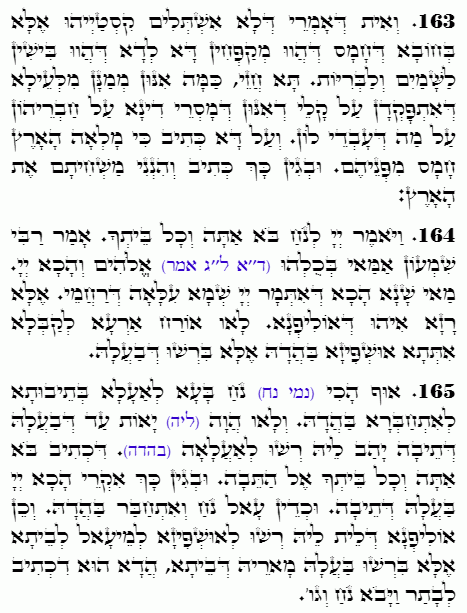Daily Zohar # 4692 – Noach – Wait for the invitation to enter
Daily Zohar 4692

Hebrew translation:
164. וַיֹּאמֶר ה’ לְנֹחַ בֹּא אַתָּה וְכָל בֵּיתְךָ. אָמַר רַבִּי שִׁמְעוֹן, לָמָּה בְּכֻלָּם [אָמַר] אֱלֹהִים וְכָאן יְיָ? מַה שּׁוֹנֶה כָּאן שֶׁנֶּאֱמַר ה’, הַשֵּׁם הָעֶלְיוֹן שֶׁל הָרַחֲמִים? אֶלָּא סוֹד הוּא שֶׁלָּמַדְנוּ – אֵין דֶּרֶךְ אֶרֶץ שֶׁתְּקַבֵּל אִשָּׁה אוֹרֵחַ עִמָּהּ אֶלָּא בִּרְשׁוּת בַּעְלָהּ.
165. אַף כָּךְ [גַּם נֹּחַ.] נֹחַ רָצָה לְהִכָּנֵס לַתֵּבָה לְהִתְחַבֵּר עִמָּהּ, וְלֹא הָיָה [לוֹ] רָאוּי עַד שֶׁבַּעַל הַתֵּבָה יִתֵּן לוֹ רְשׁוּת לְהִכָּנֵס [עִמָּהּ], שֶׁכָּתוּב בֹּא אַתָּה וְכֹל בֵּיתְךָ אֶל הַתֵּבָה. וְלָכֵן נִקְרָא כָּאן ה’, הַבַּעַל שֶׁל הַתֵּבָה, וְאָז נִכְנַס נֹחַ וְהִתְחַבֵּר עִמָּהּ. וְכֵן לָמַדְנוּ שֶׁאֵין רְשׁוּת לְאוֹרֵחַ לְהִכָּנֵס לְבַיִת אֶלָּא בִּרְשׁוּת בַּעְלָהּ, בַּעַל הַבַּיִת. זֶהוּ שֶׁכָּתוּב אַחַר כָּךְ וַיָּבֹא נֹחַ וְגוֹ’
.
Zohar Noach
Continued from previous DZ
#163
And some say that the full measure of their iniquity was only reached due to the sin of violence (חמס, chamas), for they were robbing and oppressing each other. This is because, through this behavior, they were harmful to Heaven and other people. Come and see how many appointed exist above, assigned to receive the voices of those who report injustices committed against them by others to the Heavens. About this sin, it is written, “כִּי מָלְאָה הָאָרֶץ חָמָס מִפְּנֵיהֶם” “For the earth is filled with violence because of them” (Genesis 6:13), meaning that each person would report their grievances against their fellow to Heaven. Therefore, it is written about them,”וְהִנְנִי מַשְׁחִיתָם אֶת הָאָרֶץ” “Behold, I am bringing destruction upon them along with the earth” (Genesis 6:13).
Notes:
This passage underscores the gravity of the sin of חמס, chamas (corruption, theft, violence) in the generation of the Flood. It reveals that their downfall was not only due to idolatry or immorality but also because of the harm they inflicted upon each other. This behavior led to spiritual chaos, as individuals continually reported each other’s wrongdoings to Heaven, intensifying the divine judgment against them. The Zohar underscores the interconnectedness of human behavior and divine response, showing that injustice and oppression disrupt not only earthly relationships but also draw consequences from above, affecting the stability of the world. This serves as a stark reminder of the importance of ethical behavior and compassion in sustaining both societal and cosmic harmony, and the weight of our moral responsibilities in this regard.
#164
Rabbi Shimon asked why, in all the verses is, the name Elokim (אלהים, God) used, but in this verse, the name YHVH appears. What changed here that the name YHVH, the supreme name of mercy, is used? This is a secret we have learned: it is not proper for a woman to invite a guest without her husband’s permission.
Notes:
The Zohar imparts wisdom on the necessity of balancing mercy and judgment. The use of YHVH in place of Elokim signifies a compassionate intervention, indicating that Malchut requires alignment with Zeir Anpin to enact mercy rather than strict judgment. The analogy of a wife consulting her husband before inviting a guest underscores the crucial need for unity and harmony within the divine attributes, ensuring that even judgment is tempered by mercy. This teaches that the ideal divine interaction with the world is one of balanced compassion, aligning judgment with mercy for a higher, holistic purpose.
#165
In the same way, Noah sought to enter the Ark, which represents Malchut, to connect with it. However, it was not proper for him to enter until the “בעל” “husband” of the Ark gave him permission, as it is written, “בֹּא אַתָּה וְכֹל בֵּיתְךָ אֶל הַתֵּבָה” “Come, you and all your household, into the Ark” (Genesis 7:1). This is why the verse here uses the name YHVH, as YHVH is the “husband” of the Ark. For YHVH represents Zeir Anpin, and the Ark represents Malchut. Then Noah entered and united with the Ark. Similarly, we have learned that a guest does not have permission to enter a house without the consent of its owner, the בַּעַל הַבַּיִת (ba’al habayit, master of the house). Thus, the verse later says, “וַיָּבֹא נֹחַ” “And Noah entered…”
{||}

 Previous: Noach
Previous: Noach

